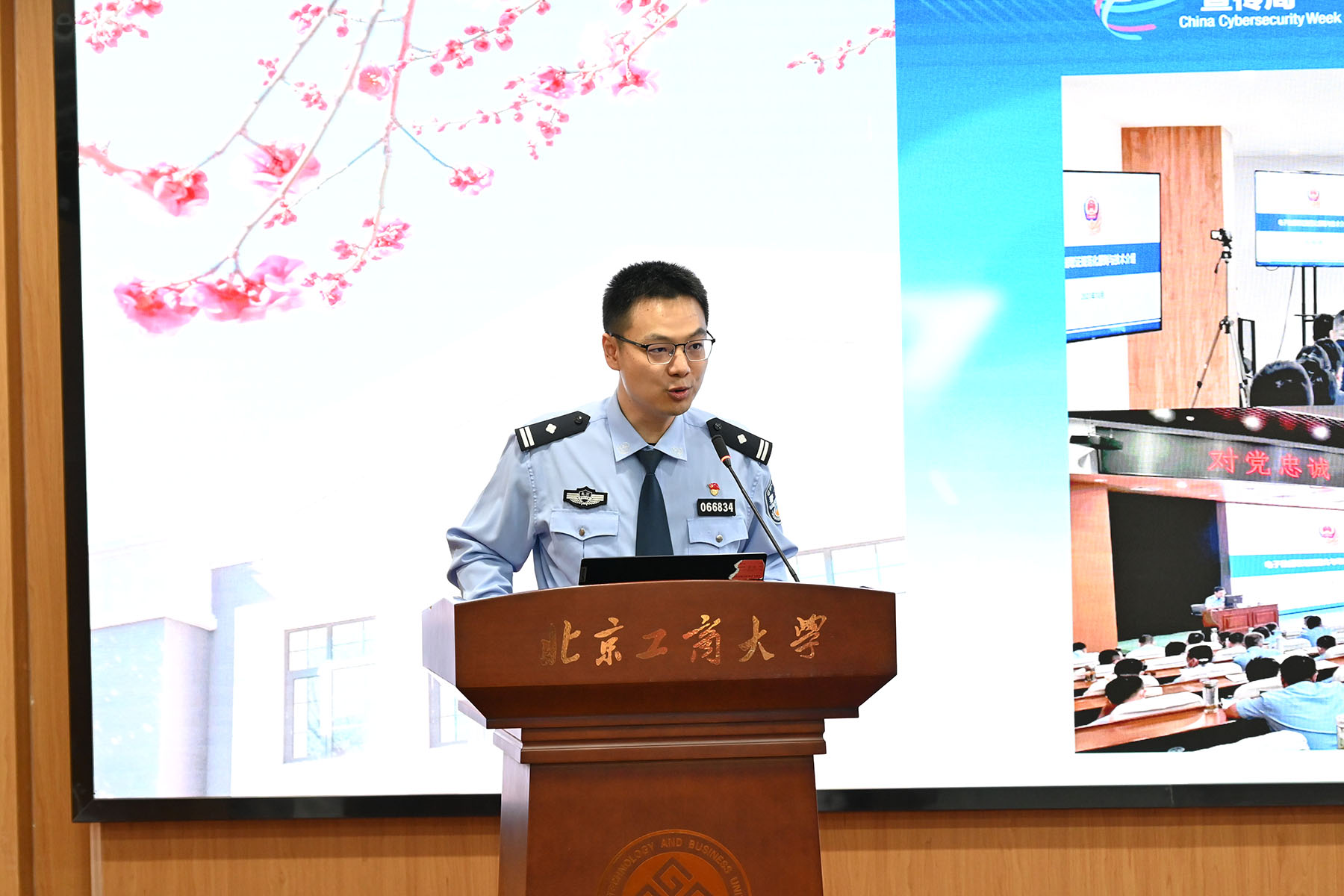From hidden cameras in toys to QR code tricks, students experience hands-on lessons that turn digital curiosity into online caution, Meng Shuyan reports.

In the auditorium of Beijing's Haidian Experimental Primary School, a fluffy panda toy sat innocently in the hands of Zhang Haitao, the director of the school's information center — until he revealed the secret hidden inside.
"It looks fine, doesn't it?" he asked. Then he pointed to the large screen behind him, where a live feed from a hidden camera in the panda's eyes suddenly appeared. Gasps of surprise rippled through the rows of students.
The demonstration didn't stop there. Zhang invited two students to the stage to scan a QR code printed on a poster for a shared power bank. He then asked them to take a photo of him. Within moments, he pulled up the phones' photo galleries on his computer — revealing that scanning the QR code had given him control over the devices.
READ MORE: Anti-fraud alliance proposed
He went on to show how easily the devices' microphones could also be accessed.
"Curiosity is your greatest asset," Zhang told the students. "But it can just as easily put you in danger."
The students sat in rapt silence, hanging on his every word.
Zhang noted that for today's so-called "digital natives", understanding online threats and navigating the digital world safely has already become a core skill — a need addressed by the 2025 Beijing National Cybersecurity Week, held from Sept 15 to 21 across schools in Beijing. At the primary school level, for example, digital safety modules have been integrated into two fundamental courses.
"But classroom teaching alone is not enough," Zhang said. "Only through interactive demonstrations and hands-on practice do abstract risks become real, helping students build their first layer of protection online."

Curiosity meets caution
The effects of the immersive lessons were visible. Sixth grader Fang Xi was shaken by the hidden camera demonstration. "I told my parents as soon as I got home. We decided: don't mess with other people's devices and always protect your privacy."
His classmate Liu Muying was impressed by the password-cracking demonstration and immediately tested her own password on a professional website. "It would take hundreds of years to crack," Liu said proudly. "I guess that makes me a little cybersecurity expert."
Even before the event, the students had already begun noticing the darker corners of the online world. Liu's classmate Miao Ruoyi had spotted hostility in comment sections. "Someone posts a fair comment, and then others write really nasty replies, and they might end up arguing," she said.
Liu herself had come across videos insulting women. Thanks to school and parental guidance, she knew how to handle such content: "If I see an inappropriate ad or video, I swipe it away immediately."
Still, their awareness of online safety is only beginning to take shape. When asked about the specific dos and don'ts under the Cybersecurity Law, the students hesitated. They knew about anti-fraud apps but admitted they had never used them.

Digital awareness gap
Cybersecurity challenges become more subtle at the college level.
Gao Jing, a lecturer at the Cyber Information Center of Beijing Technology and Business University (BTBU), observed that college students clearly recognize online risks but remain highly confident in their technical skills.
"They often believe they can spot and avoid traps, so they underestimate the need for caution," she said. "This 'knowing but not acting' paradox is the biggest concern."
During National Cybersecurity Week, the university held a "Cyber Police on Campus" event to help students become more aware of online dangers.
Gao emphasized that scams targeting college students are increasingly tailored to their interests and spending habits, making them harder to detect.
"For example, students obsessed with pop idols often struggle to resist so-called 'exclusive ticket' offers, while those who shop online regularly can easily fall for 'refund and compensation' scams," she explained.
To counter these tailored schemes, Gao said educational strategies must evolve. For example, BTBU now incorporates attack-and-defense drills and simulated scam calls into cybersecurity lessons, helping students understand the psychology behind these tricks and improve their judgment.
This training focuses not only on skills but also on mindset. "Monitoring students' well-being and providing rapid support channels are just as important as teaching cybersecurity," Gao said, noting that students under high stress or financial pressure are particularly vulnerable.
"Many students want financial independence as soon as they enter college," said 19-year-old Xu Jiarong from the audience. "When their guard is down, they may easily fall for part-time jobs or online tasks promising 'low investment, high returns'."
New graduates anxious about stepping into society are also at risk. "Those who are impatient for quick success and lack social experience are the easiest targets," added 18-year-old Zhao Yixuan.
For these first-year students, digital literacy isn't abstract — it's something they actively put into practice. When faced with AI-generated misinformation, for example, they have developed their own strategies. Zhao checks for logical inconsistencies. "Some of AI's statements don't follow normal reasoning," he said. Xu, meanwhile, recognizes certain AI templates and phrasing, emphasizing the importance of tracing sources and cross-checking information.
Sometimes, they even "fight fire with fire" — using third-party AI tools to detect whether suspicious content was AI-generated.
They also use their digital skills to protect family members from online scams. Xu noticed that older relatives are often more easily deceived, both because of limited digital experience and their desire for social connection.
"Especially with new scams like AI face-swapping or synthetic voices, they can be particularly convincing," she said, adding that she routinely helps her elders remove fraudulent messages from their phones and carefully explains the risks.
Zhao shares videos of trending scams with his family. "Staying in touch matters," he said. "If a scammer pretends to be me, a single phone call can clear up any misunderstanding."
He sums up his role simply: "My job is just to pre-bunk. Once I've warned them about a scam, it loses its power when someone tries it on them."
Contact the writer at mengshuyan@i21st.cn


